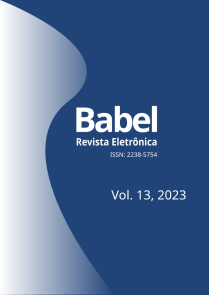Senses of English Language in the common national curriculum base and in the base curriculum of the territory of Santa Catarina
DOI:
https://doi.org/10.69969/revistababel.v13i.15309Keywords:
Common National Curriculum Base. Base Curriculum of Territory of Santa Catarina. Discourse analysis. English language teaching and learning.Abstract
Departing from broughts made (2009) and Foucault (199) about education, and analysis as a theoretical and methodological basis the materialist Discourse Analysis, this article is a way of how the National Common Curriculum Base (BNCC) and the Base Curriculum of Territory of Santa Catarina (CBTC) describes the English language. In this way, the objective of this research is to understand the meanings of the English language for these documents. For this, use excerpts from the introductory texts to the English Language curriculum component for the Elementary School stage of both documents. It can be seen that the BNCC tries to justify the inclusion of the English language as a non-component of the statutes of the whole country to place it in a different framework from other languages: it is a foreign language; for the BNCC, it is a lingua franca, widespread in Brazilian society. The CBTC, although largely the BNCC, contradicts the Base in some senses and some points of divergence with the Base.
Downloads
References
BRASIL. Parâmetros Curriculares Nacionais: Terceiro e Quarto ciclos do Ensino Fundamental – Língua Estrangeira. Brasília: MEC/SEF, 1998. Disponível em: http://portal.mec.gov.br/seb/arquivos/pdf/pcn_estrangeira.pdf. Acesso em: 03 jan. 2021.
CORACINI, Maria José. A celebração do outro: arquivo, memória e identidade: línguas (materna e estrangeira), plurilinguíssimo e tradução. Campinas: Mercado de Letras, 2007.
DERRIDA, Jacques. Monolingualism of the Other or the Prosthesis of Origin. California: Stanford University Press, 1998.
GESSER, Audrei. Líbras: que língua é essa? Crenças e preconceitos em torno da língua de sinais e da realidade surda. São Paulo: Parábola, 2009.
FINARDI, Kyria Rebeca; PORCINO, Maria Carolina. Tecnologia e Metodologia no Ensino de Inglês: Impacto da Globalização e da Internacionalização. Ilha do Desterro, 2013. Disponível em: http://www.scielo.br/scielo.php?pid=S2175-80262014000100239&script=sci_arttext. Acesso em: 03 jan. 2021.
FOUCAULT, Michel. A ordem do discurso. 3. ed. São Paulo: Edições Loyola, 1996.
FURLANETTO, Priscila Fernanda. O professor global o ensino da língua inglesa: uma visão a partir do pós-método. Curitiba: InterSaberes, 2019.
GRIGOLETTO, Marisa. O inglês na atualidade: uma língua global. Campinas: Enciclopédia das Línguas do Brasil, 2013. Disponível em: https://www.labeurb.unicamp.br/elb2/pages/artigos/lerArtigo.lab?id=98. Acesso em: 13 jan. 2021.
GRIGOLETTO, Marisa; FORTES. Sentidos de direitos de aprendizagem e cidadania em documentos curriculares oficiais: discurso, ensino e subjetividade. São Gonçalo, n. 17, 2020. Disponível em: https://www.e-publicacoes.uerj.br/index.php/pensaresemrevista/article/view/47127/31847. Acesso em: 16 fev. 2022.
HARAWAY, Donna J. Manifesto ciborgue: Ciência, tecnologia e feminismo-socialista no final do século XX. In: HARAWAY, Donna J.; KUNZRU, Hari; TADEU, Thomaz (Org.). Antropologia do ciporgue. Belo Horizonte: Autêntica, 2009.
HENRY, Paul. A ferramenta imperfeita: língua sujeito e discurso. Campinas: Editora da Unicamp, 1992.
KUMARAVADIVELU, B. Toward a Postmethod Pedagogy. TESOL Quarterly, v. 35, n. 4, p. 537-560, 2001. Disponível em: http://www.bkumaravadivelu.com/articles%20in%20pdfs/2001%20Kumaravadivelu%20Postmethod%20Pedagogy.pdf. Acesso em: 19 ago. 2020.
LEFFA, Vilson. Ensino de línguas: passado, presente e futuro. Belo Horizonte: Revista de Estudos da Linguagem, 20 ed. n.º2, 2012. Disponível em: http://periodicos.letras.ufmg.br/index.php/relin/article/view/2755/2710. Acesso em 09 jan. 2021.
LEFFA, Vilson. A lingüística aplicada e seu compromisso com a sociedade. Trabalho apresentado no VI Congresso Brasileiro de Lingüística Aplica. Belo Horizonte: UFMG, 7-11 de outubro de 2001. Disponível em: http://www.leffa.pro.br/textos/trabalhos/la_sociedade.pdf. Acesso em: 16 jan. 2021.
NIETZSCHE, Friedrich. A verdade e a mentira no sentido extramoral. Rio de Janeiro: Comum v. 6, n. 17, p. 5 a 23, jul./dez. 2001.
ORLANDI, Eni P. Análise de Discurso: princípios e procedimentos. Campinas: Pontes Editores, 2013.
ORLANDI, Eni Puccinelli. Interpretação, autoria e efeitos do trabalho simbólico. Petrópolis: Vozes, 1996.
ORLANDI, Eni P. Interpretação; autoria, leitura e efeitos do trabalho simbólico. Campinas: Pontes Editores, 2007.
ORLANDI, Eni Puccinelli. Paráfrase e polissemia: a fluidez nos limites do simbólico. Campinas: RUA, v. 4, n. 1, p. 9–20, 2015. Disponível em: https://periodicos.sbu.unicamp.br/ojs/index.php/rua/article/view/8640626. Acesso em: 3 maio 2022.
PÊCHEUX, Michel. Ler o arquivo hoje. In. ORLANDI, Eni P. (org.) [et al.]. Gestos de leitura: da história no discurso. Tradução: Bethânia S. C. Mariani [et al]. Campinas: Editora da Unicamp, 1994.
PÊCHEUX, Michel. Semântica e discurso: uma crítica à afirmação do óbvio. Campinas: Editora da Unicamp, 1995.
PFEIFFER, Claudia; SILVA, Mariza Vieira Da; PETRI, Verli. Língua escolar: Afinal, que língua é essa? Revista Ecos v. 27 n. 02, 2019. Disponível em: https://periodicos.unemat.br/index.php/ecos/article/view/4372/3488. Acesso em: 20 nov. 2021.
SANCHES, Maria de Fátima Gomes. As estratégias utilizadas no ensino da língua inglesa no pós-método para nativos e imigrantes digitais. Augusto Guzzo Revista Acadêmica, São Paulo, n. 11, 2013. Disponível em: http://www.fics.edu.br/index.php/augusto_guzzo/article/view/151. Acesso em: 20 fev. 2022.
SANTA CATARINA. Currículo base da educação infantil e do ensino fundamental do território catarinense. Florianópolis: Secretaria de Estado da Educação, 2019.
SILVA, Mariza. Discurso, Escola e Leituras. Palhoça: IV Seminário Discurso, Cultura e Mídia – SEDISC, Revista Laboratório Ciência em Curso. Disponível em: https://www.youtube.com/watch?v=SPhlXwOu2Pk. Acesso em: 23 ago. 2022.
SOUZA JUNIOR, Paulo Roberto. A questão de gênero, sexualidade e orientação sexual na atual Base Nacional Comum Curricular (BNCC) e os movimentos LGBTTQIS. Salvador: Revista de Gênero, Sexualidade e Direito v. 4 n. 01, 2018. Disponível em: https://www.indexlaw.org/index.php/revistagsd/article/view/3924/pdf. Acesso em 20 nov. 2021.
UPHOFF, Dörthe. A história dos Métodos de Ensino de Inglês no Brasil. In: BOLOGNINI, Carmen Zink. A língua inglesa na escola. Discurso e ensino. Mercado de Letras, 2008. Disponível em: https://edisciplinas.usp.br/pluginfile.php/4490214/mod_resource/content/5/Uphoff%202008.pdf. Acesso em: 09 jan. 2021.
VOLÓCHINOV, Valentin. Marxismo e filosofia da linguagem: problemas fundamentais do método sociológico na ciência da linguagem. São Paulo: Editora 34, 2018.
Published
How to Cite
Issue
Section
License
Copyright (c) 2023 Babel: Revista Eletrônica de Línguas e Literaturas Estrangeiras

This work is licensed under a Creative Commons Attribution-ShareAlike 4.0 International License.
Os autores detém os direitos autorais sem restrições, porém ao submeter os originais, concordam em transferir a este periódico os direitos da primeira publicação. Isto deve ser informado em caso de nova edição do texto. As produções que derivarem deste material, devem obrigatoriamente citar a fonte. Os textos publicados nesta revista, salvo indicações contrárias, encontram-se sob uma licença Creative Commons Atribuição 4.0 Internacional.

